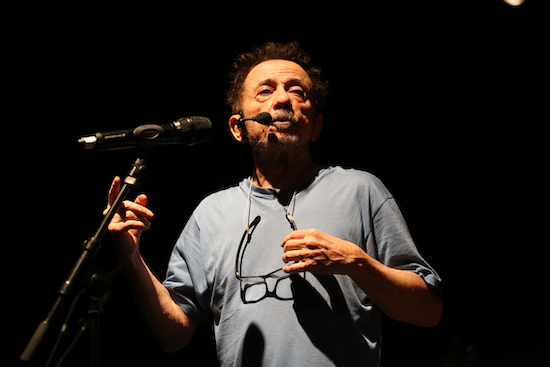Jan 13, 2026 2:09 PM
More Trump-Kennedy Center Cancellations
The fallout from the renaming of the John F. Kennedy Center for the Performing Arts to include President Donald…

Tom Zé was part of a Brazilian contingent at the Moers Festival—which ran June 7-10 in Moers, Germany—that also included Clube Da Encruza, Sambanzo and Absimu Curtu.
(Photo: Hans Walter Kropp)The Moers Festival started in 1971, and its roots reach deep into the vortex of free improvisation. That’s still the case today, even as ample room’s been made for rock, electronics and folkloric grit.
The festival—which ran June 7-10 in Moers, Germany, just north of Düsseldorf—revels in unpredictability, both in sound and environment. Tim Isfort, now in his third year as artistic director, has continued the event’s established vibrations, while increasing the aura of controlled chaos and spontaneous vitality.
This year, the main stage at Festival Hall was rebuilt in a diagonal fashion, occupying a corner, with the venue’s seating rearranged. A huge wooden tank dominated the back of the stage, garden gnomes gathered outside the main hall and helium balloons featured artist’s names on their surfaces. A sprawl of food and drink vendors was just outside the main hall, as well as a secondary stage alternating its set times with indoor programing.
There’s a consistent glut of inspiring performances, and this year, the festival offered a particularly strong international character, inviting substantial performers from Tokyo and São Paulo, as well as hosting several acts from France and Serbia.
The 82-year-old Tom Zé retains a childlike curiosity—and the body language of a much younger man—his status as Brazil’s most idiosyncratic songwriter undiminished. Zé embodied the spirit of the festival, his words coming in doses both amusing and profound. Other Brazilian players appeared in multiple permutations, different bands with contrasting musical aims. The main-stage set by Clube Da Encruza was mellow—bordering on bland—but the quartet offshoot of Sambanzo played one of the weekend’s highlight sets, loaded with seething saxophone solos and nagging basslines. Another Brazilian sub-combo, Absimu Curtu, ventured into minimalist ambient areas, experimentally abstract.
The Tokyo outfits stretched from the avant-smooth irritations of Yasei Collective to the more imaginative contributions of Tatsuya Yoshida (drums) and Toshimaru Nakamura (electronics). Generally, the French contingent made less of an impact, aside from Abacaxi, the trio fronted by guitarist Julien Desprez, specializing in a stuttering punk-funk complexity, loaded with extreme textures and operating a tap-dancing approach to effects pedals.
From Belgrade, the D.K. Heroes delivered a quality main-stage set, but were best experienced late each night in the Vortex Kafana, a small tent outside the main hall that aimed to recreate a Serbian tavern experience. Smoking and shots of Slivovic were encouraged, while largely toothless fiddler Zelko Stefanović and guitarist Vania Stojnov—who fronted a quintet—vied for flyaway complexity in their exuberant solos.
The weekend’s kaleidoscope also featured a meeting between the Arkestra’s Marshall Allen (saxophone/electronics) and Günter “Baby” Sommer (drums); saxophonist Joshua Redman fronting the WDR Big Band (playing “Moers Abstractions,” a descendant of Gunther Schuller’s “Jazz Abstractions”); and a sequence of artists appearing from the spotlit tiered seats of the main hall, including a rare showing by English vocalist Phil Minton and the Tokyo duo Akaten, soloing on hugely amplified fly-zippers.
Assembling members of Faust, Fire! and dälek, Anguish made its debut live appearance, providing a fitting festival peak. As its set progressed, the ensemble gathered a sludge-slow headbanging mass of rap, industrial electronics layering and ripping tenor saxophone soloing, the latter courtesy of a typically enraged Mats Gustafsson.
This year, the Moers Festival aggressively pursued a crusading internationalism, aiming to counteract current global strife, even if it’s all just a weekend immersion in an alternative existence. The Global Improvisers Orchestra made its debut, as well, combining players from nine countries. It was led by saxophonist Jan Klare, who also organized the improvising Moers Sessions, which took place early each morning and then again late each night.
Rarely can such vivid cross-fertilization be witnessed during a single festival, as artists who hadn’t previously played—or even met—produced vibrant results in mixed, small groups. DB

Belá Fleck during an interview with Fredrika Whitfield on CNN.
Jan 13, 2026 2:09 PM
The fallout from the renaming of the John F. Kennedy Center for the Performing Arts to include President Donald…

Peplowski first came to prominence in legacy swing bands, including the final iteration of the Benny Goodman Orchestra, before beginning a solo career in the late 1980s.
Feb 3, 2026 12:10 AM
Ken Peplowski, a clarinetist and tenor saxophonist who straddled the worlds of traditional and modern jazz, died Feb. 2…

The success of Oregon’s first album, 1971’s Music Of Another Present Era, allowed Towner to establish a solo career.
Jan 19, 2026 5:02 PM
Ralph Towner, a guitarist and composer who blended multiple genres, including jazz — and throughout them all remained…

Rico’s Anti-Microbial Instrument Swab
Jan 19, 2026 2:48 PM
With this year’s NAMM Show right around the corner, we can look forward to plenty of new and innovative instruments…

Richie Beirach was particularly renowned for his approach to chromatic harmony, which he used to improvise reharmonizations of originals and standards.
Jan 27, 2026 11:19 AM
Richie Beirach, a pianist and composer who channeled a knowledge of modern classical music into his jazz practice,…